Unit 5 Work with language
unit 5 language points

4、只有努力学习而且从不放弃,你才能成功。
Only if you study hard and never give up can you succeed .
5、只有他能在一小时内完成这个工作。
Only he can finish the work in an hour .
The Rest of Elias’s Story 伊莱亚斯的故事续集
2.We were put into a position in which we had either to accept we were less important or fight the government.
新教材高中英语人教版选择性必修一Unit5 Using Language
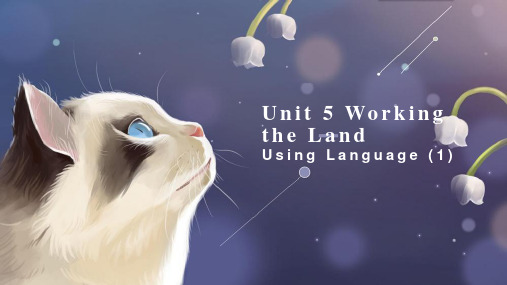
Think and share
1. What are all the possible causes of world hunger that you can think of? Droughts, floods, poverty, and war.
Think and share
2. What can people and countries do to help alleviate these causes? (Drougபைடு நூலகம்ts)
5. What does the FAO suggest countries do? The FAO suggests countries focus on making new achievements in agriculture.
David: … However, every country needs to focus on making new achievements in agriculture, …
Observe and talk
What can you see in the photos? How do you think each photo relates to world hunger?
What can you see in the photo? How do you think it relates to world hunger?
To get rid of poverty, we can develop economy and carry out programs that give people more opportunities.
Think and share
2. What can people and countries do to help alleviate these causes? (War) War may be solved through international negotiation.
大学英语精读Unit 5 language work
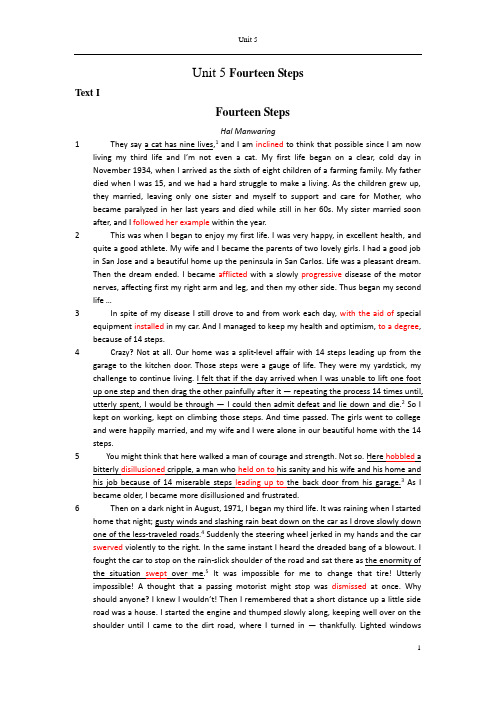
Unit 5 Fourteen StepsText IFourteen StepsHal Manwaring1They say a cat has nine lives,1 and I am inclined to think that possible since I am now living my third life and I’m not even a cat. My first life began on a clear, cold day in November 1934, when I arrived as the sixth of eight children of a farming family. My father died when I was 15, and we had a hard struggle to make a living. As the children grew up, they married, leaving only one sister and myself to support and care for Mother, who became paralyzed in her last years and died while still in her 60s. My sister married soon after, and I followed her example within the year.2This was when I began to enjoy my first life. I was very happy, in excellent health, and quite a good athlete. My wife and I became the parents of two lovely girls. I had a good job in San Jose and a beautiful home up the peninsula in San Carlos. Life was a pleasant dream.Then the dream ended. I became afflicted with a slowly progressive disease of the motor nerves, affecting first my right arm and leg, and then my other side. Thus began my second life …3In spite of my disease I still drove to and from work each day, with the aid of special equipment installed in my car. And I managed to keep my health and optimism, to a degree, because of 14 steps.4Crazy? Not at all. Our home was a split-level affair with 14 steps leading up from the garage to the kitchen door. Those steps were a gauge of life. They were my yardstick, my challenge to continue living. I felt that if the day arrived when I was unable to lift one foot up one step and then drag the other painfully after it — repeating the process 14 times until, utterly spent, I would be through — I could then admit defeat and lie down and die.2 So I kept on working, kept on climbing those steps. And time passed. The girls went to college and were happily married, and my wife and I were alone in our beautiful home with the 14 steps.5You might think that here walked a man of courage and strength. Not so. Here hobbled a bitterly disillusioned cripple, a man who held on to his sanity and his wife and his home and his job because of 14 miserable steps leading up to the back door from his garage.3As I became older, I became more disillusioned and frustrated.6Then on a dark night in August, 1971, I began my third life. It was raining when I started home that night; gusty winds and slashing rain beat down on the car as I drove slowly down one of the less-traveled roads.4 Suddenly the steering wheel jerked in my hands and the car swerved violently to the right. In the same instant I heard the dreaded bang of a blowout. I fought the car to stop on the rain-slick shoulder of the road and sat there as the enormity of the situation swept over me.5It was impossible for me to change that tire! Utterly impossible! A thought that a passing motorist might stop was dismissed at once. Why should anyone? I knew I wouldn’t! Then I remembered that a short distance up a little side road was a house. I started the engine and thumped slowly along, keeping well over on the shoulder until I came to the dirt road, where I turned in —thankfully. Lighted windowswelcomed me to the house and I pulled into the driveway and honked the horn.7The door opened and a little girl stood there, peering at me. I rolled down the window and called out that I had a flat tire and needed someone to change it for me because I had a crutch and couldn’t do it myself. She went into the house and a moment later came out bundled in raincoat and hat, followed by a man who called a cheerful greeting. I sat there comfortable and dry, and felt a bit sorry for the man and the little girl working so hard in the storm. Well, I would pay them for it. The rain seemed to be slackening a bit now, and I rolled down the window all the way to watch. It seemed to me that they were awfully slow and I was beginning to become impatient. I heard the clank of metal from the back of the car and the little girl’s voice came clearly to me. “Here’s the jack-handle, Grandpa.”She was answered by the murmur of the man’s lower voice and the slow tilting of the car as it was jacked up.6There followed a long interval of noises, jolts and low conversation from the back of the car, but finally it was done. I felt the car bump as the jack was removed, and I heard the slam of the truck lid, and then they were standing at my car window.8He was an old man, stooped and frail-looking under his slicker. The little girl was about eight or ten, I judged, with a merry face and a wide smile as she looked up at me. He said, “This is a bad night for car trouble, but you’re all set now.”“Thanks,” I said. “How much do I owe you?” He shook his head. “Nothing. Cynthia told me you were a cripple —on crutches.Glad to be of help. I know you’d do the same for me. There’s no charge, friend.” I held out a five-dollar bill. “No! I like to pay my way.”He made no effort to take it and the little girl stepped closer to the window and said quietly, “Grandpa can’t see it.”9In the next few frozen seconds the shame and horror of that moment penetrated and I was sick with an intensity I had never felt before.7 A blind man and a child! Fumbling, feeling with cold, wet fingers for bolts and tools in the dark —a darkness that for him would probably never end until death. I don’t remember how long I sat there after they said good night and left me, but it was long enough for me to search deep within myself and find some disturbing traits. I realized that I was filled to overflowing with self-pity, selfishness, indifference to the needs of others and thoughtlessness.8 I sat there and said a prayer.10“Therefore all things whatsoever ye would that men should do to you, do ye even so to them: for this is the law and the prophets.”9To me now, months later, this Scriptural admonition is more than just a passage in the Bible. It is a way of life, one that I am trying to follow. It isn’t always easy. Sometimes it is frustrating, sometimes expensive in both time and money, but the value is there. I am trying now not only to climb 14 steps each day, but in my small way to help others. Someday, perhaps, I will change a tire for a blind man in a car — someone as blind as I had been.Paragraphs 1-2Words and Expressions1. be inclined to be likely or tend to do sth.e.g. In the first instance I was inclined to refuse, but then I reconsidered.起初我想拒绝,但后来还是重新考虑了。
五年级英语Book 5 Unit 5 Work with Language 课后练习
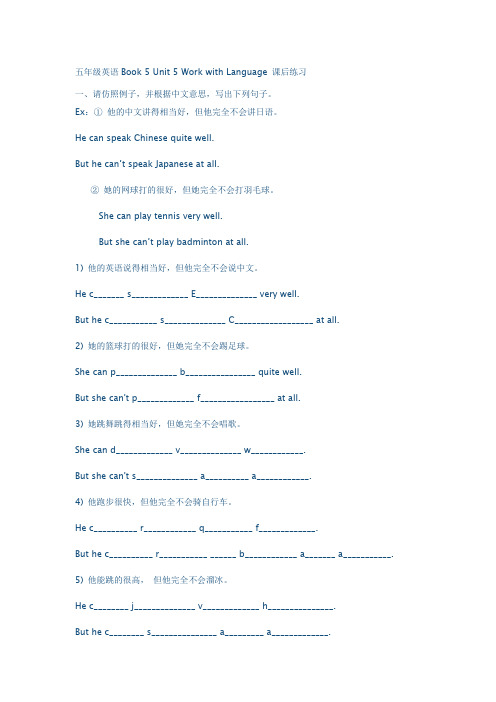
五年级英语Book 5 Unit 5 Work with Language 课后练习一、请仿照例子,并根据中文意思,写出下列句子。
Ex:①他的中文讲得相当好,但他完全不会讲日语。
He can speak Chinese quite well.But he can’t speak Japanese at all.②她的网球打的很好,但她完全不会打羽毛球。
She can play tennis very well.But she can’t pla y badminton at all.1) 他的英语说得相当好,但他完全不会说中文。
He c_______ s_____________ E______________ very well.But he c___________ s______________ C__________________ at all.2) 她的篮球打的很好,但她完全不会踢足球。
She can p______________ b________________ quite well.But she can't p_____________ f_________________ at all.3) 她跳舞跳得相当好,但她完全不会唱歌。
She can d_____________ v______________ w____________.But she can't s______________ a__________ a____________.4) 他跑步很快,但他完全不会骑自行车。
He c__________ r____________ q___________ f_____________.But he c__________ r___________ ______ b____________ a_______ a___________.5) 他能跳的很高,但他完全不会溜冰。
新课标人教版英语选择性必修一Unit5 Using Language 导学案及答案
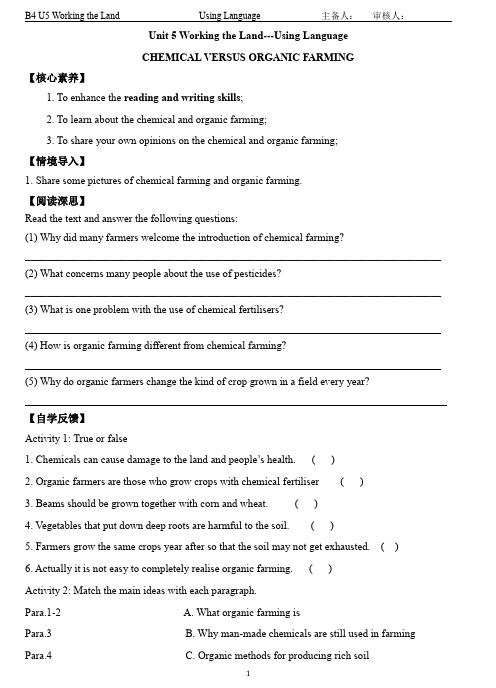
Unit 5 Working the Land---Using LanguageCHEMICAL VERSUS ORGANIC FARMING【核心素养】1. To enhance the reading and writing skills;2. To learn about the chemical and organic farming;3. To share your own opinions on the chemical and organic farming;【情境导入】1. Share some pictures of chemical farming and organic farming.【阅读深思】Read the text and answer the following questions:(1) Why did many farmers welcome the introduction of chemical farming?______________________________________________________________________________ (2) What concerns many people about the use of pesticides?______________________________________________________________________________ (3) What is one problem with the use of chemical fertilisers?(4) How is organic farming different from chemical farming?(5) Why do organic farmers change the kind of crop grown in a field every year?【自学反馈】Activity 1: True or false1. Chemicals can cause damage to the land and people’s health. ( )2. Organic farmers are those who grow crops with chemical fertiliser ( )3. Beams should be grown together with corn and wheat. ( )4. Vegetables that put down deep roots are harmful to the soil. ( )5. Farmers grow the same crops year after so that the soil may not get exhausted. ( )6. Actually it is not easy to completely realise organic farming. ( )Activity 2: Match the main ideas with each paragraph.Para.1-2 A. What organic farming isPara.3 B. Why man-made chemicals are still used in farming Para.4 C. Organic methods for producing rich soilPara.5 D. The problems with chemical farming【自主探究】Discuss these questions in groups1. Is the author of the passage for or against organic farming? How do you know?2. What other disadvantages of chemical farming did the author not list?3. How might the following items be problems and how important are they for organic farming?natural animal waste used as fertiliserhigher cost of producing foodgreater effort required to farm【成果展示】Please show your answers based on the above discussion.【点评精讲】1. Language features of the passage;2. Lead the students to share their opinions on chemical and organic farming.3. Complicated sentence analysis【随堂检测】Decide whether your group supports chemical farming or organic farming, then complete the outline below:Topic sentence: In my opinion, farming is preferable to farming because Point 1:Point 2:Point 3:Conclusion:【巩固应用】Exercise 1 and exercise 2 of P.58参考答案Unit 5 Working the Land---Using LanguageCHEMICAL VERSUS ORGANIC FARMING【阅读深思】Read the text and answer the following questions:(1) Why did many farmers welcome the introduction of chemical farming?Because chemical pesticides and artificial fertilisers can fight crop disease and increase production (2) What concerns many people about the use of pesticides?It may make them ill and even cause cancer.(3) What is one problem with the use of chemical fertilisers?Crops grown with them usually grow too fast to be rich in nutrition. They may look beautiful on the outside, but inside there is usually more water than essential minerals, and they often have less flavor as well.(4) How is organic farming different from chemical farming?It doesn’t use any chemicals. Organic farmers focus on keeping their soil rich and free of disease through natural means.(5) Why do organic farmers change the kind of crop grown in a field every year?Because different crops put important minerals back into the ground, making it ready for the next batch of crops.【自学反馈】Activity 1: True or false1. Chemicals can cause damage to the land and people’s health. ( T )2. Organic farmers are those who grow crops with chemical fertiliser ( F )3. Beams should be grown together with corn and wheat. (F)4. Vegetables that put down deep roots are harmful to the soil. (F)5. Farmers grow the same crops year after so that the soil may not get exhausted. (F)6. Actually it is not easy to completely realise organic farming. (F)Activity 2: Match the main ideas with each paragraph.Para.1-2 A. What organic farming isPara.3 B. Why man-made chemicals are still used in farmingPara.4 C. Organic methods for producing rich soilPara.5 D. The problems with chemical farming。
Unit 5 Language points 课件-高中英语人教版(2019)选择性必修第一册
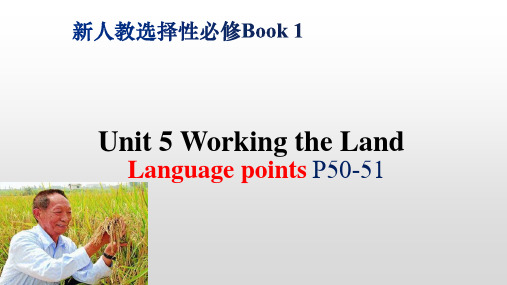
词汇精讲 句型剖析
课前•基础认知 课堂•重难突破
学以致用 单句语法填空 (1)She gives the impression of being generous,but in reality (real) she is a very selfish girl. (2)I didn’t realise (real) that you were not happy.
词汇精讲 句型剖析
课前•基础认知 课堂•重难突破
语境领悟 (1)Given his age,he is very strong and healthy. 考虑到他的年龄,他已经非常强壮健康了。 (2)Given that the students need more exercise,the head teacher has decided to add more PE classes. 考虑到学生们需要更多的锻炼,校长已决定增加更多体 育课。
vt.出产(作物);产生(收益、效益等) yield to sb/(doing) sth 屈服于某人/做某事 yield sth/sb up (to sb)放弃
课前•基础认知 课堂•重难突破
词汇精讲 句型剖析
学以致用 单句语法填空 (1)It’s polite to yield up your seat to an old lady on the
replace his old one. (3)There is a possibility of severe water shortages (short)
in the foreseeable future. (4) Shortly (short) after he left the bus station,came a
人教版选择性必修第四册UNIT 5 Launching your career课文中英文对照
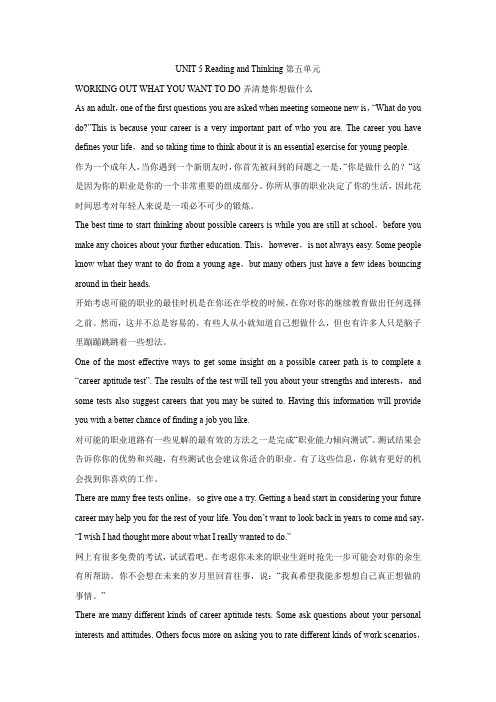
UNIT 5 Reading and Thinking第五单元WORKING OUT WHA T YOU WANT TO DO弄清楚你想做什么As an adult,one of the first questions you are asked when meeting someone new is,“What do you do?”This is because your career is a very important part of who you are. The career you have defines your life,and so taking time to think about it is an essential exercise for young people.作为一个成年人,当你遇到一个新朋友时,你首先被问到的问题之一是,“你是做什么的?“这是因为你的职业是你的一个非常重要的组成部分。
你所从事的职业决定了你的生活,因此花时间思考对年轻人来说是一项必不可少的锻炼。
The best time to start thinking about possible careers is while you are still at school,before you make any choices about your further education. This,however,is not always easy. Some people know what they want to do from a young age,but many others just have a few ideas bouncing around in their heads.开始考虑可能的职业的最佳时机是在你还在学校的时候,在你对你的继续教育做出任何选择之前。
然而,这并不总是容易的。
广州版五年级上册英语教案 Module 2 Unit 5 (work with language)

广州市小学英语五年级上册Module 2 AbilitiesUNIT 5 What Can the Robot Do? (Work with Language)一、Language Focus:*V ocabulary:1. ride a bike2.skate*Structure:1. Can you speak Japanese?No, I can’t speak Japanese at all.2. Can you swim?Yes, I can swim well. /Yes, I can swim very well. /Yes, I can swim quite well.二、Teaching ProcedureProcedure Teaching steps Teacher’sactivitiesPupils’activitiesPurpose1. Warming up 1.SongCan You RunFast?2. Chant 1: WhatCan You Do?3Chant2:Everybody Can1. Let the pupilslook at thescreen and sing.2. Chant withthe pupils.1. The pupilssing the songtogether.2. Chanttogether withactions.1.活跃课堂气氛,自然地进入学习状态。
1.Free talk 1 .Ask: What 1.Answer 1.Free talk创设2. RevisionAnd Practice 2. Learningobjects3. RevisionGame: Go andstop4.由 Game引出新词ride a bike,skate5.通过图片帮助学生理解not atall ,well ,very well, quitewell6. 创设情景:小记者采访7.鼓励学生为2008奥运会学好英语,增强体date is today?What can youdo on theplayground?2. Tell thelearning objectsof this lesson.3. Speak out thephrases.4. To helppupilsremember thenew words.5. Show thepictures to helpthemunderstand.6. Make amodel how toask.7. To tell themhow to take partin the match. Togive them morechance to speakEnglish in class..2. Listen andbe ready tolearn.3. Listen, sayand do theactionsquickly.4. Continue toplay the gameand learn newwords.4.Try tounder- standthedifferentdegrees ofability andperformance.5. Listen,watch andtake part in.6. Have amatch andpractice thelanguagepoints.更多开口说英语的机会。
高中英语Unit5SectionⅡLearningAboutLanguage新人教版选择性必修第一册
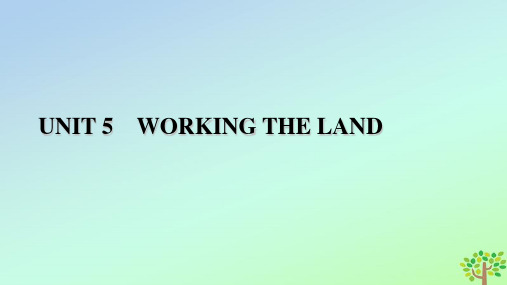
4 用所给词的适当形式填空 ①What surprised me most __w_a_s__ (be) that the man in rags was a millionaire. ②What he needs most __is___(be) money. ③When and where the meeting will be held ___h_a_s_b_e_e_n__d_e_c_id_e_d___ (decide) already. ④That the coal workers are still alive __i_s__(be)a wonder.
what(ever)引导的主语从句表示一件“事情”,而whoever引导的主 语从句指“人”。
3.连接副词(when,where,why,how等) 连接副词引导主语从句并在从句中一般作状语。 How this happened is not clear to anyone. 这件事怎样发生的,谁也不清楚。 When we will have a meeting is an important question. 我们何时举行会议是个重要的问题。 Where I spend my summer vacation is no business of yours. 我在哪里过暑假不关你的事。
It seems that it is going to rain. 看起来要下雨了。 5.It+及物动词+宾语+主语从句 It surprised him why they came to visit him suddenly. 让他吃惊的是他们为什么突然来看他。
五年级英语Book5 Unit1 Work with Language 课后练习四
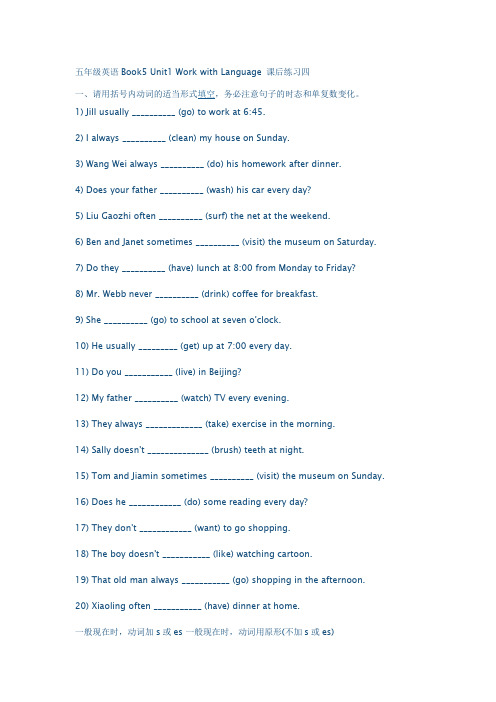
五年级英语Book5 Unit1 Work with Language 课后练习四一、请用括号内动词的适当形式填空,务必注意句子的时态和单复数变化。
1) Jill usually __________ (go) to work at 6:45.2) I always __________ (clean) my house on Sunday.3) Wang Wei always __________ (do) his homework after dinner.4) Does your father __________ (wash) his car every day?5) Liu Gaozhi often __________ (surf) the net at the weekend.6) Ben and Janet sometimes __________ (visit) the museum on Saturday.7) Do they __________ (have) lunch at 8:00 from Monday to Friday?8) Mr. Webb never __________ (drink) coffee for breakfast.9) She __________ (go) to school at seven o'clock.10) He usually _________ (get) up at 7:00 every day.11) Do you ___________ (live) in Beijing?12) My father __________ (watch) TV every evening.13) They always _____________ (take) exercise in the morning.14) Sally doesn't ______________ (brush) teeth at night.15) Tom and Jiamin sometimes __________ (visit) the museum on Sunday.16) Does he ____________ (do) some reading every day?17) They don't ____________ (want) to go shopping.18) The boy doesn't ___________ (like) watching cartoon.19) That old man always ___________ (go) shopping in the afternoon.20) Xiaoling often ___________ (have) dinner at home.一般现在时,动词加s或es 一般现在时,动词用原形(不加s或es)主语为“第三人称单数”主语为I,you,复数以下特殊情况,动词用原形(不加s或es):ϖ句子中出现以下的单词:ϖdon’tdoesn’tDo …?Does …?。
Unit5UsingLanguageChemicalversusorganicfarmingAsse

What do you know about the two farming methods? chemical/conventional farming
organic farming
Organic Farming
Prediction
1. What is the text about?
title Chemical farming
What organic farming is and _h_o_w__i_t _k_e_e_p__th_e__s_o_il_.rich
Conclusion
Title Text type:
Part 1: Exposition (Para 1&2)
Part 2: (Para 3&4)
Part 3: (Para 5)
Organic farming
pictures
2. What type of writing is it? A. Narration(记叙文) B. Exposition(说明文) C. Argumentation(议论文)
chemical versus organic farming
Chemical farming is farming using _c_h_e_m_i_c_a_l _p_e_s_ti_c_id__e_s and _a_r_ti_fi_c_ia_l_f_e_r_ti_li_s_e_r_s_ while organic farming is simply farming __w_i_th_o_u_t__ using any chemicals.
of the soil to help keep it rich.
• Organic farming is nowhere near able to meet
Unit 5 Using Language 课件 -高中英语人教版(2019)选择性必修第四册

2. How does the applicant respond to each of the job requirements in each paragraph of her application?
Para. 1: I would like to apply for the position of camp helper. Please find my CV attached.
Similar advanced expressions of showing appreciation:
(1) Were I offered the job, I would treasure the opportunity and spare no effort to do it well. (2) I would appreciate it if you could give me this golden chance / take my application into account. (3) ...
Ⅳ Language points
Ⅴ
Homework
Homework
假定你是李华,暑假在伦敦学习,得知当地美术馆要举 办中国画展。请写一封信申请做志愿者,内容包括: 1. 写信目的 2. 个人优势 3. 能做的事情 注意: 1. 词数100左右; 2. 可以适当增加细节,以使行文连贯。
After brainstorming, write your own application letter. Then two students are welcomed to share their application letters and the whole class help to polish improper expressions based on the checklist.
小学六年级上册英语说课稿【三篇】
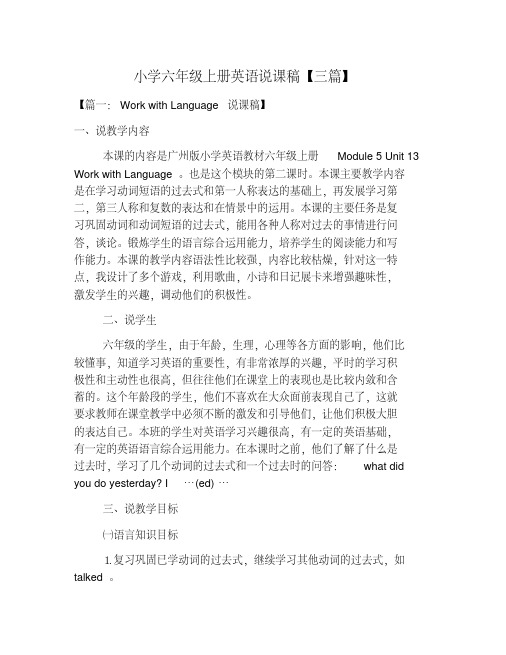
小学六年级上册英语说课稿【三篇】【篇一:Work with Language说课稿】一、说教学内容本课的内容是广州版小学英语教材六年级上册Module 5 Unit 13 Work with Language。
也是这个模块的第二课时。
本课主要教学内容是在学习动词短语的过去式和第一人称表达的基础上,再发展学习第二,第三人称和复数的表达和在情景中的运用。
本课的主要任务是复习巩固动词和动词短语的过去式,能用各种人称对过去的事情进行问答,谈论。
锻炼学生的语言综合运用能力,培养学生的阅读能力和写作能力。
本课的教学内容语法性比较强,内容比较枯燥,针对这一特点,我设计了多个游戏,利用歌曲,小诗和日记展卡来增强趣味性,激发学生的兴趣,调动他们的积极性。
二、说学生六年级的学生,由于年龄,生理,心理等各方面的影响,他们比较懂事,知道学习英语的重要性,有非常浓厚的兴趣,平时的学习积极性和主动性也很高,但往往他们在课堂上的表现也是比较内敛和含蓄的。
这个年龄段的学生,他们不喜欢在大众面前表现自己了,这就要求教师在课堂教学中必须不断的激发和引导他们,让他们积极大胆的表达自己。
本班的学生对英语学习兴趣很高,有一定的英语基础,有一定的英语语言综合运用能力。
在本课时之前,他们了解了什么是过去时,学习了几个动词的过去式和一个过去时的问答:what did you do yesterday? I…(ed)…三、说教学目标㈠语言知识目标⒈复习巩固已学动词的过去式,继续学习其他动词的过去式,如talked。
⒉复习、操练和巩固一般过去式的问与答,并归纳句型:Did you/he/she/they…?Yes,I/he/she/they did. No,I/he/she/they didn’t.What did you do?I…Ved.What did he/she/they do? He/she/they…Ved.㈡语言技能目标⒈能熟练地说出已学动词的过去式。
book5 unit2 work with language练习题(月份与日期).doc
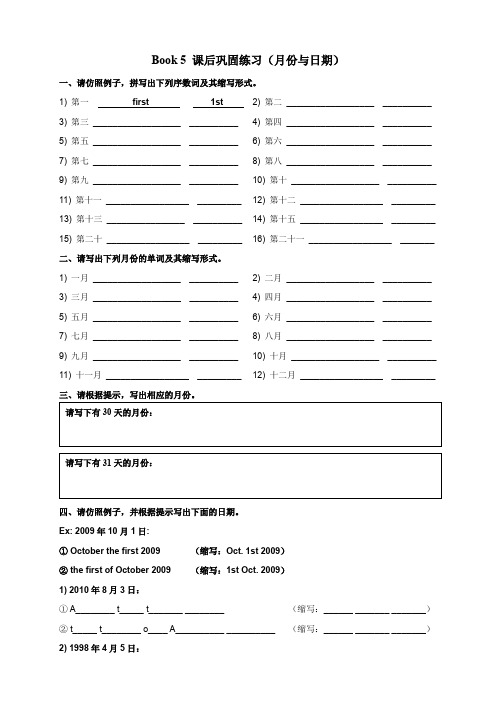
Book 5 课后巩固练习(月份与日期)一、请仿照例子,拼写出下列序数词及其缩写形式。
1) 第一first 1st 2) 第二__________________ __________ 3) 第三__________________ __________4) 第四__________________ __________ 5) 第五__________________ __________6) 第六__________________ __________ 7) 第七__________________ __________8) 第八__________________ __________ 9) 第九__________________ __________ 10) 第十__________________ __________ 11) 第十一_________________ _________ 12) 第十二_________________ _________ 13) 第十三________________ __________ 14) 第十五_________________ _________15) 第二十_________________ _________ 16) 第二十一_________________ _______二、请写出下列月份的单词及其缩写形式。
1) 一月__________________ __________ 2) 二月__________________ __________ 3) 三月__________________ __________4) 四月__________________ __________ 5) 五月__________________ __________6) 六月__________________ __________ 7) 七月__________________ __________8) 八月__________________ __________ 9) 九月__________________ __________ 10) 十月__________________ __________11) 十一月_________________ _________ 12) 十二月_________________ _________三、请根据提示,写出相应的月份。
2019外研版高中英语选择性必修三Unit5 Using Language(1) 教学设计

Unit 5 Using Language(1) 教学设计●课时内容Review: non-finite forms as subject,object and predicative主题语境:人与自然主题群:自然生态子主题:人类向自然界学习语篇类型:语法训练、文本阅读文本分析:[what]本节课的主要内容是Review: non-finite forms as subject, object and predicative。
首先探讨摘自上篇文本的例句,带领学生复习非谓语动词作主语、宾语和表语的用法,然后学习“苏州留园”和“二十四节气”两段材料。
[Why]通过看说训练、文本阅读和写作活动,进一步巩固学生对非谓语动词作主语、宾语和表语的掌握,提升学生在真实语境中的综合语言运用能力。
[How]本课时包含两段材料:第一段阅读材料是关于“苏州留园”,呈现了大量非谓语动词作主语、宾语和表语的情况,为学生复习提供了真实的语境;第二部分是一篇和二十四节气相关的一些信息,介绍了二十四节气的起源﹑意义,术语、地位等方面,语言精炼,易于学生了解,为后续写作活动提供了素材。
●课时目标1. 分析和读懂语法例句,总结和复习非谓语动词作主语﹑宾语和表语的用法,能在具体语境中正确使用非谓语动词作主语、宾语和表语。
2. 了解苏州留园和二十四节气的相关知识及英文表达。
3. 关注语法功能,增强语法意识,形成以语言运用为导向的“形式——意义——使用”三维动态语法观。
4. 运用所学知识描述二十四节气中的某一个节气,加深对大自然的了解。
●重点难点重点:非谓语动词作主语、宾语和表语的用法。
难点:关注非谓语动词作主语﹑宾语和表语的语用功能,学会在真实语境中正确运用。
●教学准备教师准备:1. 非谓语动词作主语、宾语和表语的用法和习题。
2. 苏州留园和二十四节气的相关背景知识。
学生准备:1. 预习本课词汇。
2. 预习已学的非谓语动词作主语、宾语和表语的用法。
(新教材)【人教版】20版《高中全程学习方略》选择性必修一Unit 5 Using Language(英语)

Ⅰ. 根据语境及汉语提示写出正确的单词 1. _c_h_e_m_i_c_a_l (化学的) change 2. _a_l_le_v_i_a_te_ (减轻) the sufferings 3. out of _p_o_v_e_r_ty_ (贫穷) 4. _o_r_g_a_n_ic_(有机的) farming 5. a _w_i_d_e_sp_r_e_a_d_ (分布广的, 流行的)disease
4. Why can’t we stop the use of man-made chemicals in agriculture entirely? A. Organic farming cost us a lot of money. B. Organic farming can meet people’s need. C. Chemical farming brought us huge profit. D. Chemical farming helps serve the need for food.
Ⅱ. 根据语境, 选词填空 in addition, in turn, because of, as for, as well, for instance 1. I’ll do some reading for fun, and for knowledge _a_s_w_e_l_l . 2. Theory is based on practice and _in__tu_r_n_serves practice.
5. There are jobs more dang_a_n_c_e_, training lions.
6. _B_e_c_a_u_s_e_o_f_the help you gave me that summer, my life changed.
选择性必修第一册 课件unit 5 Using Language and Other Parts
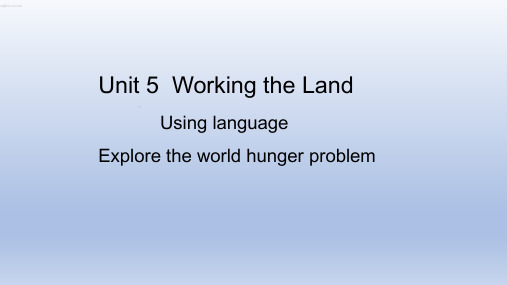
Main ideas of each parts
Part 1(Para.1-2) The problems with chemical farming Part 2(Para.3) What organic farming is Part 3(Para.4) Organic methods for producing rich soil Part 4(Para.5) Why man-made chemicals are still used in farming.
根据语境及汉语提示写出正确的单词或短语。 。
(7)kill harmful __b_a_ct_e_r_ia_(细菌) and insects (8)turn to organic farming= _sw__it_c_h to organic farming (9)shop at the local g_r_o_c_e_r_y(食品杂货店) (10)natural _w_a_s_te___(粪便) from animals (11)plant diverse crops that use different__d_e_p_t_h_s_ (深度) of soil (12)serve the high _d_e_m__a_n_d_(要求) for food around the world
What are all the possible causes of world hunger? Droughts, floods, poverty and war. What can we do to help alleviate droughts? We can invent new forms of agriculture and crops that don’t rely so much on water to tackle droughts. What can we do to help alleviate floods? We can prevent floods by building dams and levees.
Unit 5 Launching your career Using language (教案)
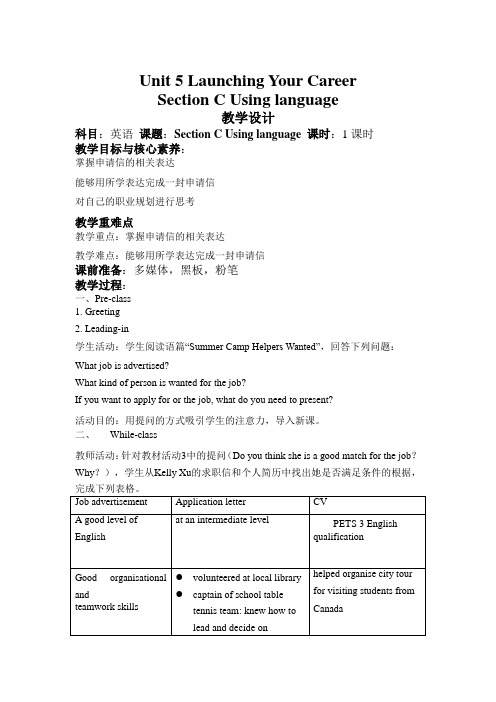
Unit 5 Launching Your CareerSection C Using language教学设计科目:英语课题:Section C Using language课时:1课时教学目标与核心素养:掌握申请信的相关表达能够用所学表达完成一封申请信对自己的职业规划进行思考教学重难点教学重点:掌握申请信的相关表达教学难点:能够用所学表达完成一封申请信课前准备:多媒体,黑板,粉笔教学过程:一、Pre-class1. Greeting2. Leading-in学生活动:学生阅读语篇“Summer Camp Helpers Wanted”,回答下列问题:What job is advertised?What kind of person is wanted for the job?If you want to apply for or the job, what do you need to present?活动目的:用提问的方式吸引学生的注意力,导入新课。
二、While-class教师活动:针对教材活动3中的提问(Do you think she is a good match for the job?Why?),学生从Kelly Xu的求职信和个人简历中找出她是否满足条件的根据,的句型。
然后教师可补充更多相关句型,为后面的写作做好铺垫。
根据以下招聘信息完成一封求职信。
Part-time Animal Shelter WorkerJob description:Non-profit animal shelter looking for an animal shelter worker to work evenings and occasional weekends. Must love dogs and cats! Not afraid to get dirty. Duties include cleaning litter boxes, cleaning kennel areas, feeding and watering animals, working in isolation rooms playing with dogs and cats, administering medication as per written instructions, and helping to maintain a clean and safe shelter.Requirements:animal care experiencefollow written and oral instructionsreliable to work unsupervisedwork at weekends and during holidaysThis job is ideal for someone who is:dependable——more reliable than spontaneousdetail-oriented——would rather focus on the details of work than the bigger picture autonomous/independent——enjoy working with little direction innovative——prefer working in unconventional ways or on tasks that require creativityhigh stress tolerance——thrive in a high-pressure environment学生活动:就上面的招聘信息,整理自己的信息,然后写一封求职信和一份个人简历。
评课

1.列老师的课的最大优点是能够贴近生活, 利用生活中的实例来呈现新内容, 学生又能够运用所学知识于现实生活中, 这一点很值得我们学习.1蔡老师在设定教学目标时能从多方面去考虑,这为有效实施教学奠定了基础。
在第一课时的开始部分所选的歌曲恰当且动听,能较大程度地吸引学生的注意力。
在两节课的活动形式多样,注重学生综合能力的培养。
另外所提供的练习题也挺科学。
值得探讨的问题是,第一,新授课的呈现和操练巩固部分的过渡略显唐突,可多创设一些情景让学生不断地重复语言知识点,达到教学的目的;第二,在巩固课中,如果从交际的角度考虑的话,在这节课要有一些交互性和目的性的活动,从而让学生灵活地运用所学的知识。
2.江老师的教学设计在导入部分很自然且易让学生明白,重点突出,尤其四个重点句型的教学由浅到深,创设多样活动让学生扎实地掌握.各项活动生动有趣,学生学起来也轻松.不过如果时间允许的话,在本节课拓展部分教师最好能和学生一起观察、思考,对本篇日记进行小节,找出写英文日记的特点和其注意事项,提高学生的写作能力和英语的运用能力,毕竟学生已到六年级,需老师适当提供给学生学习写作的机会!学习了三篇BOOK8 U4 Dialogue的教学设计,江老师能给学生讨论和想象的空间,因此学生自然会联系实际,谈论植树的全过程,学生就会说出课本以外的句子和短语,如buy a tree, give the money →climb the hill→find a place→make a tag,她对本课的重点句子也设计了游戏帮助学生上口,动词过动式读音也能注意帮助突破.任老师是先教单词,然后本课重点句,再过渡到课文,我认为单词教学不应先从音标入手(任老师采取的方法:由学生看音标自渎,老师正音),我们可以通过创设语境帮助学生理解,然后再操练,正音.我习惯教单词,句型时,把感知\理解放于首位.任老师设计的“true” or “false”练习能很好地帮助学生理解课文,发展环节也能注意让学生在比较中找规律,小结英文日记的格式、特点以及写英文日记的注意事项,值得我们参考学习.我较喜欢江老师的教学设计中间环节,任老师的发展部分.天河区五一小学Module 3 Unit 7 dialogue 教学设计中目标分析过于简单,教学内容分析不够具体.体育东的吴老师较详细具体.在学习课文的过程中,吴老师设计了问答题,填空题帮助学生理解,记忆.而五一小学的老师设计的接龙形式的呈现课文也值得学习.她是根据课文内容提问,每回答一个问题就让学生把答案连起来,要求把前面说的句子也加上来,这样一来就相当于练习多次了,当提问结束时就是一篇简短的描述中山先生的短文了。
- 1、下载文档前请自行甄别文档内容的完整性,平台不提供额外的编辑、内容补充、找答案等附加服务。
- 2、"仅部分预览"的文档,不可在线预览部分如存在完整性等问题,可反馈申请退款(可完整预览的文档不适用该条件!)。
- 3、如文档侵犯您的权益,请联系客服反馈,我们会尽快为您处理(人工客服工作时间:9:00-18:30)。
Module 2 Unit 5 Work with language
班级:姓名:小组:
【学习目标Learning aims】
1.掌握表示情感的单词:sad angry happy surprised
2.继续学习运用一般过去时描写过去的事情。
3、我会归类掌握sad/angry/happy/excited/surprised等表示情感与态度的词语,并运用于语言操练中。
4.过程与方法:能通过自主,合作,探究来达成本课的学习目标。
5.情感,态度与价值:培养学生爱护绿化的意识。
【学习重、难点The important and difficult point】
1.运用一般过去时描写过去的事情。
2、运用情感的词说句子。
【学习过程Learning steps】:
自主学习部分
一、听录音跟读下面单词,并写上中文。
sad ( ) angry ( ) surprised ( )
someone ( ) the day after tomorrow ( )
二、认读下面句子并写出中文(书本第23页第二题)
She is sad.
She is angry.
She is happy.
She is surprised.
三、请根据句子的意思画出人物面部的表情
She is sad. She is angry.
She is surprised.
合作探究部分
一、Revision:
Read and do the dictation.
二)Look ,listen andwrite the numbers of the pictures in the brackets.听录音,在相应图下面写出大写字母编号。
(书本第23页第1题)
三)用所给的词造句。
(书本第23页第三题)
1、He was when the trees grew well.
2.She was sad when .
3.They angry when .
4.We felt when so many flowers appeared.
5.They were excited when
四)模仿例句用所给的词造句。
(书本第23页第四题)
1.played tennis/yesterday/the day after tomorrow
2.cleaned the house/the day before yester/next Sunday
3.read the book/yesterday morning/this evening
4.lived there/last month/next month
五)达标测试:
选出符合图意的句子。
()1.A.She dug a hole last week.
B.She carried water for the new trees last week.
C.She picked a flower yesterday.
()2.A.These are seeds.
B.The shoots come out.
C.You can see flowers now.
()3.A.The woman is very happy now.
B.The woman is very angry now.
C.The woman is very sad now.
()4.A.There wasn't a window in my old bedroom.
B.There wasn't a bed in my old bedroom.
C.There was a bed in my old bedroom.
()5. A. They planted trees yesterday. 5.
B. They played football yesterday.
C. They watered the tree yesterday.。
